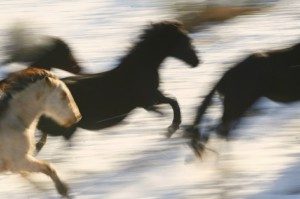
I am thinking to invent a new missiological subspecialty. I propose calling it “The Equestrian Assisted Missiology” – TEAM, for short. (Missiologists are fond of acronyms.)
The idea occurred to me while reading through the Book of Zechariah, once again over the summer. I love this book: the entire book is a kind of missiology. It is rooted in the missionary heart of God. It is addressed to God’s missionary people. Its horizon is the mission of God for all the peoples of the earth. And horses, it turns out, feature prominently.
Zechariah delivered his message in the early months of 520 BC. It was directed to the missionary people of Israel, recently returned from long years of captivity in Babylon. They were a people in mission. They were the heirs of Abraham, blessed to be a blessing “in all the families of the earth” (Genesis 12:1-3). They were the magnetic emblem and center of God’s presence in the world (Zechariah 8:22,23). They were the builders and guardians of the Temple in Jerusalem, too – the Temple that would eventually draw all peoples to its courts (Isaiah 2:2). This in fact was their immediate task: their mission was to build the Temple. But the task was not going so very well.
Nebuchadnezzar had destroyed the Temple, for one thing, when he laid siege to Jerusalem, took down the city’s walls, and carried away her people in 586 BC (2 Kings 24-25). The Temple was still a pile of rubble in the early months of 520. For another thing, the task seemed enormous and the resources disastrously few: it could bring sensitive observers to tears (cf. Ezra 3:12). There were detractors, too: the people surrounding Jerusalem did not want another temple in the neighborhood (Ezra 4:4). And then, of course, there were many other useful things to do. Zechariah’s contemporary, Haggai, describes a few of them: houses to build; home remodeling projects; yards and gardens to tend, and so on (Haggai 1). The mission of God in the world could wait for a while (v.2).
Zechariah appeared just at this juncture: with an enormous mission awaiting God’s people and many distractions along the way. He spoke in a series of visions, as Old Testament prophets sometimes did. And the series was framed by visions of horses (1:7-17, 6:1-8).
In chapter one, horses appear in a glen of myrtle trees. “They are those whom the Lord has sent to patrol the earth,” Zechariah is told (v.10). They represent, it seems, the sovereign design of God for all nations. But they would have been very difficult to see: myrtle trees are a dense, shrubby kind of undergrowth – more like a bush than a tree. There were probably four horses in the glen, as in chapter six; Zechariah seems to see only three.
In chapter six, horses appear again – this time between bright mountains of bronze, with chariots in tow. Zechariah is told again that they are sent to patrol the earth (v.7). He learns in particular that they have “set [God’s] spirit at rest in the north country” (v.8). This, too, would have been very difficult to see. The “north country” was where Nebuchadnezzar swept in to ruin the country and carry its people away to Babylon. Zechariah must have waked with a start at the mere thought of it – this was the last in his series of visions.
What do the horses mean? They signify, I think, that God’s mission is charging forth around the world – even if we do not see it. The horses mean that God is in control – even if we wonder. They mean that we are enlisted, too: there is a “temple” to build, the gospel to share, prayers to be made, sacrifice to undertake. The horses are waiting at the door even now, you see. They are snorting a little, eager for our partnership in the mission of God in the world.
I have a friend who practices psychotherapy in Michigan. She uses horses in her practice, and calls the idea “Equestrian Assisted Psychotherapy” (EAP). She reports that EAP is particularly effective in cases of adolescent eating disorders. (To be honest, EAP is where I got the idea for TEAM.)
But TEAM is more broad and effective than EAP, I am sure. TEAM is for all Christian people: for you, too, and for me. God’s chariots and horses are pursuing his mission of grace for all the families of the earth. And God invites us along for the ride.
Empowered trotting.
I’ll say!